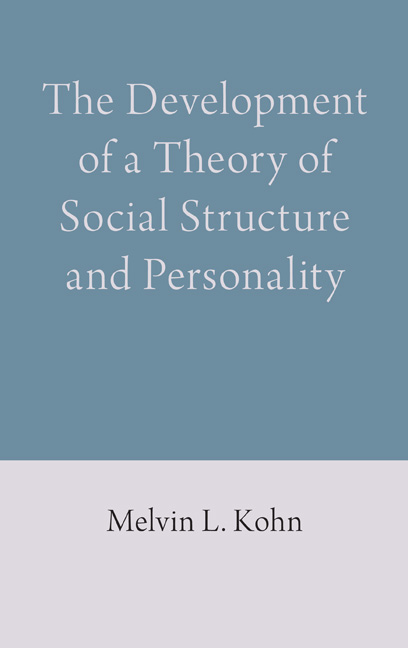Book contents
- Frontmatter
- Contents
- Preface
- 1 Hagerstown and Schizophrenia
- 2 Social Stratification and Parent–Child Relations in Washington, DC
- 3 The Torino Study
- 4 Men Employed in Civilian Occupations in the United States
- 5 The Transformation of the Occupations Study into a Longitudinal Analysis
- 6 Life on Sabbatical Leave in Norway and at the National Institute of Mental Health
- 7 Class, Stratification, and Personality
- 8 Poland under Communism
- 9 Occupational Self-Direction and Distress in Poland
- 10 The Vietnam War, Nixon, and Me
- 11 Japan
- 12 Germany – West and East
- 13 Poland and Ukraine in Transition to Capitalism and Democracy
- 14 The Presidency of the American Sociological Association, Ronald Reagan, and My Job Switch
- 15 My Two Exploratory Expeditions to China
- 16 China in Transition to a Modern Economy
- 17 Retirement, and My Last Sabbatical, at Deep Springs Junior College
- 18 The Theory I Propose
- Index
8 - Poland under Communism
Published online by Cambridge University Press: 12 July 2019
- Frontmatter
- Contents
- Preface
- 1 Hagerstown and Schizophrenia
- 2 Social Stratification and Parent–Child Relations in Washington, DC
- 3 The Torino Study
- 4 Men Employed in Civilian Occupations in the United States
- 5 The Transformation of the Occupations Study into a Longitudinal Analysis
- 6 Life on Sabbatical Leave in Norway and at the National Institute of Mental Health
- 7 Class, Stratification, and Personality
- 8 Poland under Communism
- 9 Occupational Self-Direction and Distress in Poland
- 10 The Vietnam War, Nixon, and Me
- 11 Japan
- 12 Germany – West and East
- 13 Poland and Ukraine in Transition to Capitalism and Democracy
- 14 The Presidency of the American Sociological Association, Ronald Reagan, and My Job Switch
- 15 My Two Exploratory Expeditions to China
- 16 China in Transition to a Modern Economy
- 17 Retirement, and My Last Sabbatical, at Deep Springs Junior College
- 18 The Theory I Propose
- Index
Summary
One could say that my life as a cross-national sociologist began with my 14 months’ sabbatical in Norway, and one would not be far off. Or one could say that it began when I was Len Pearlin's sidekick on the subsequent Torino study. But I like to think that my truly becoming a cross-national scholar began one day in 1970, in Varna, Bulgaria, the day I first met those incredible Poles.
We were at a convention, my first, of the International Sociological Association (ISA). One session of the program especially appealed to me, a session with a title like “Social Stratification in Socialist Society.” It had been organized by the Soviet Sociological Society and I was extraordinarily eager to attend. What were the Soviets doing speculating about social stratification in their own society?
That session turned out to be a sparring match between Soviets and Poles, with Hungarians joining in support of the Poles and East Germans playing supporting roles in subservience to the Soviets – almost all of it in English, as if for my benefit. This was a time of imposed orthodoxy in Eastern Europe, and the head of the Soviet delegation, a commissar named M. N. Rutkevich, was an especially severe imposer. The Soviet line – I caricature it here, but only slightly – was “Yes, we do have some occupational differentiation in socialist societies, but not social stratification – that's impossible under socialism.” The Polish response, put forward by their leading Marxist scholar, Wlodzimierz Wesolowski, in essence was, “We've read our Marx too, but we have also done surveys, and our findings come out remarkably similar to those of the West Europeans and the Americans. In socialist Poland, we certainly do have social stratification, and our system of social stratification is not much different from that of capitalist societies.” This response infuriated Rutkevich and his followers. Their reaction seemed to spur Wesolowski and his compatriots to the energetic pursuit of what I later learned was the Poles’ favorite indoor game, baiting the Soviets.
Who are these incredible people? I had to find out. Under the constrained circumstances of the Varna Congress, the best that I could do was to move to where the Poles were sitting and exchange what Americans called “business cards” and Japanese more appropriately called “name cards.” These gestures were followed in later weeks and months by exchanges of books and reprints.
- Type
- Chapter
- Information
- Publisher: Anthem PressPrint publication year: 2019



